Your cart is empty


Vuelta 1983: How Hinault’s victory changed 80s cycling
With Fignon and Lemond as team mates, Bernard Hinault outraced a clique of Spanish talent to win the 1983 Vuelta. But the effort cost him dearly
Words: William Fotheringham
Grand Tours come in three sizes: run of the mill, spectacular, and epochal – those which define an entire era and which dictate cycling’s pattern for years to come. The 1983 Vuelta falls into the third category.
It could be summed up as “ Bernard Hinault versus the Spanish Armada” – the great Frenchman pitted against the golden generation of Spanish cyclists which included Marino Lejarreta, Julian Gorospe, Pedro Delgado, Alvaro Pino, Eduardo Chozas, Alberto Fernandez and Vicente Belda.
The “Armada” was a loose coalition of senior Spanish professionals who would combine to ensure victory for one of their own, as Robert Millar was to find to his cost a couple of years later.
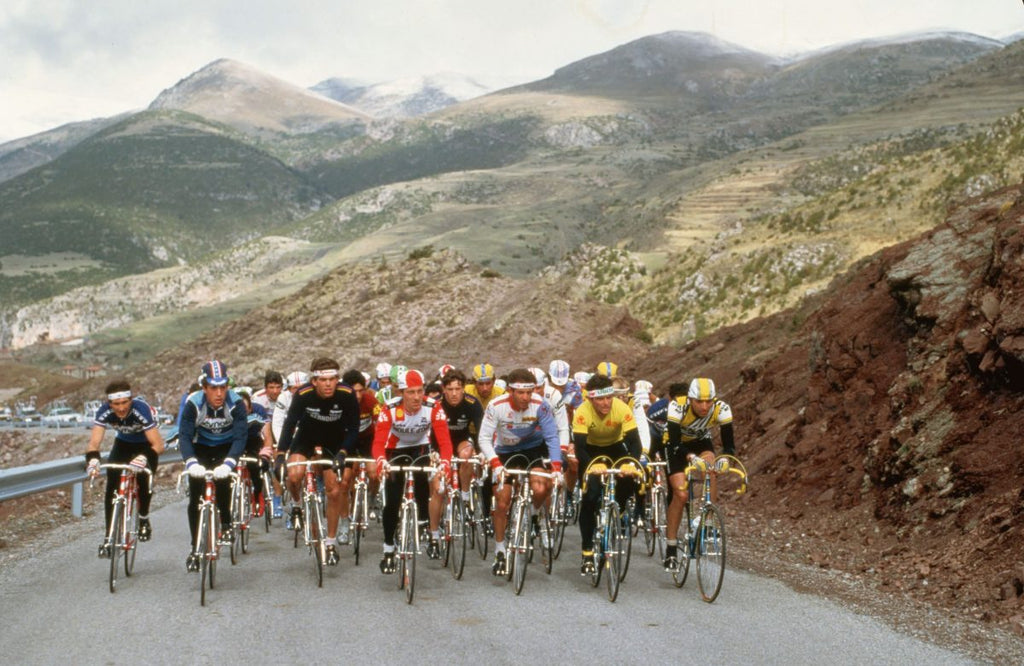
The coalition’s emergence coincided with Spanish resurgence after the Franco years, live television coverage of their home Tour and began a golden period which culminated in Miguel Indurain’s five Tour wins in the early 1990s. Of the “Armada”, it was Delgado, who finished 15th in that year’s Vuelta, who would go on to make the biggest mark on cycling.
This was the hardest fought of Hinault’s nine Grand Tour wins; one by one the “Armada’s” various members raised their heads, pitted their strength against the Breton, and were crushed.

Lejarreta was first, then Fernandez, finally, and most painfully, Gorospe, who still believed years later that had the Reynolds team hit Hinault hard on one day in particular, stage 14 to Leon, they could have eliminated him once and for all.
Instead, Hinault came good on the final mountain stage from Salamanca to Avila, when Laurent Fignon showed his potential in helping his leader dislodge Gorospe on the Puerto de Serranillos.

After an epic 80-kilometre escape, with Lejarreta and Belda barely hanging on, Hinault had turned Gorospe’s slender 10 second lead into a 20 minute deficit.
For Hinault and his Renault team, this was a turning point. The four-times Tour winner had been nursing tendinitis in his right knee for much of the race. His knees had been something of a weakness since his early years as a cyclist, and he had famously been forced to pull out of the 1980 Tour when wearing the yellow jersey due to an injury.
At the Vuelta, the cause was unclear – changes to his saddle position were rumoured, and the horrendous weather due to the Spanish Tour’s spring date probably contributed as well – but the damage was far more severe than in 1980.

At the end of the race, Hinault had trouble walking and four days afterwards, he was unable to start a criterium. In July, he had an operation on the tendon, and he was never physically quite the same imposing force as he had been in his prime, even though he went on to take his fifth Tour in 1985.
His place at the Renault team was taken by Fignon, who after his help in the Vuelta landed a surprising win in that year’s Tour de France. With no certainty that Hinault would recover, team manager Cyrille Guimard became convinced that his Breton star’s time was truly up.
That decision was vindicated, or so it seemed, when his other protege, Greg LeMond – who started that Vuelta but abandoned due to illness – won that year’s world championship.
Hinault would leave Renault to set up the La Vie Claire team. LeMond and Fignon would take over, although Lemond would later join Hinault in the new team. The interactions between the three men set up a series of battles in the Tour – often featuring Delgado in particular – which would define the Tour de France throughout the 1980s.

The epics in 1984, 1985 and 1986, as well as 1989, could all be traced back to Hinault’s decision to fight through the pain in his knee and take a Vuelta victory which clearly came at way too high a cost.
William Fotheringham is the author of The Badger, Bernard Hinault and the Fall and Rise of French Cycling, published by Yellow Jersey Press.

Rouleur Team Cars Bone China Mugs

Rouleur ELITE Jet Water Bottle Bidon - 550ml

Rouleur Logo Organic Unisex T-Shirt - Black/White

Team Cars | Campagnolo - Organic Cotton Unisex T-Shirt

Rouleur Logo Organic Unisex T-Shirt – White

Rouleur Logo - Organic Sweatshirt - Unisex - Burgundy

Team Cars | Peugeot - Organic Cotton Unisex T-Shirt

Colours of the Peloton - Short Sleeve Base Layer - Men's

Rouleur Logo Organic Unisex T-Shirt – Tonal Grey

Team Cars | Raleigh - Organic Cotton Unisex T-Shirt

Rouleur Logo Organic Sweatshirt - Unisex - Grey

Coppi - Rouleur Notebook

Rouleur Logo - Organic Sweatshirt - Unisex - French Navy

Rouleur Logo - Organic Hooded Sweatshirt - Unisex - Heather Blue

Rouleur Logo - Organic Jogger Pants - Unisex - French Navy

Rouleur x Kaweco Rollerball Pen - Black + Gold foil logo

Allez - Organic Cotton Unisex T-Shirt

Tours Issue - Rouleur Tote Bag

Dai! - Organic Cotton Unisex T-Shirt

True Grit - Rouleur Notebook

Rouleur Water Bottle Bidon - Ride Fast, Read Slow - Cream + Green

Rouleur Water Bottle Bidon - Green + Pink

Rouleur x Kaweco Rollerball Pen - Brass + Black etched logo

Rouleur Embroidered Organic Cotton Unisex T-Shirt - Natural Cotton + Green

!Vamos! - Organic Cotton Unisex T-Shirt

Colours of the Peloton - Short Sleeve Jersey - Women's

Rouleur Logo Women's T-Shirt - Navy

Rouleur x Kaweco Aluminium Rollerball Pen - Silver + Engraved logo

Rouleur Logo - Organic Jogger Pants - Unisex - Heather Grey

The Football Educator
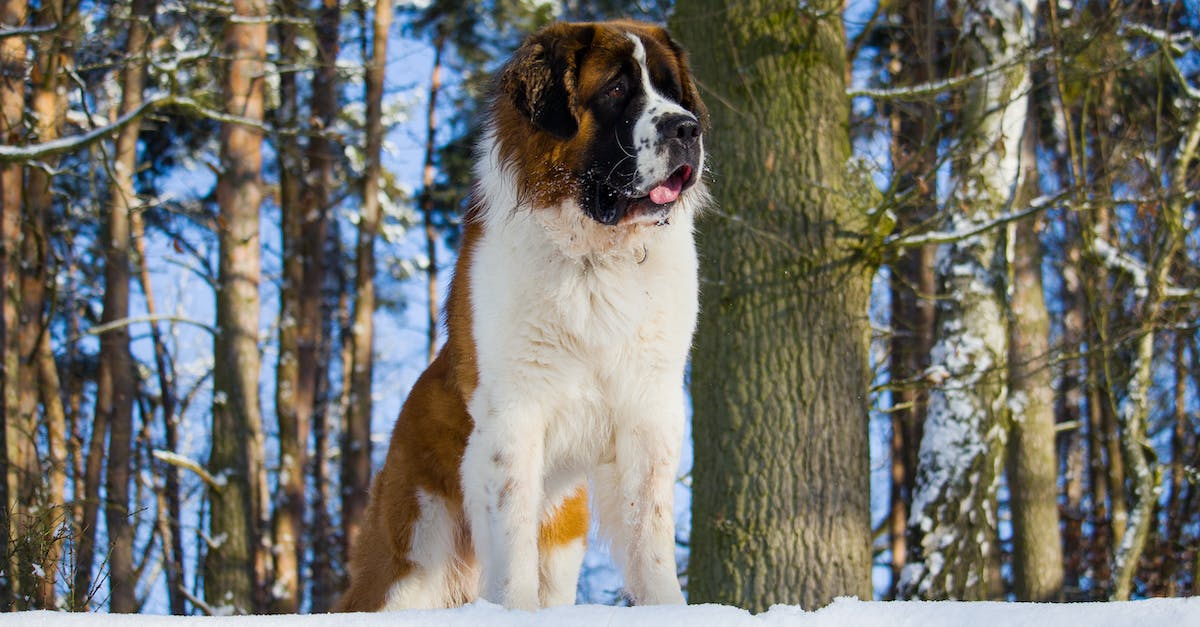
The Legendary Career of Bernard Hinault: The Badger of Cycling Dominance
Bernard Hinault, a name synonymous with cycling legend, redefined what it means to be a champion. Known as “The Badger” for his tenacious style, Hinault’s career is a tapestry of triumphs that continue to inspire cyclists around the world.
With five Tour de France victories under his belt, Hinault’s legacy is unmatched. He’s not just a cyclist; he’s a master tactician whose story is a lesson in grit and grandeur. In this article, we’ll dive into the life of a man who pedaled his way into history.
Get ready to explore the remarkable journey of Bernard Hinault, from his early days in the saddle to his rise as a cycling titan. Whether you’re a die-hard fan or new to the world of cycling, Hinault’s story is sure to captivate and motivate.
Table of Contents
Rising Through the Ranks
Bernard Hinault’s ascent in the world of cycling was nothing short of meteoric. At the tender age of 20 , he already demonstrated a knack for endurance and strategy, essential components for a prospective tour champion. Hinault didn’t just partake in races; he mastered them, often pushing through pain and fatigue to clinch victory after victory.
In the early stages of his career, Hinault quickly marked himself as a rider to watch. After turning professional in 1975, it took him just a year to capture his first major win at the prestigious Omloop Het Volk race. This triumph wasn’t just a triumph; it was a declaration of his burgeoning prowess and a sign of the legend he was to become.
Hinault’s talent shone through in stage races, where his resilient demeanor and tactical intelligence set him apart from his contemporaries. As he tackled each event, his exceptional time-trialling skills and climbing abilities became increasingly apparent, laying the groundwork for the Grand Tours that would eventually etch his name into the annals of cycling history.
- 1978 : Hinault secures his first Tour de France win
- 1980 : Wins Giro d’Italia, showcasing his versatility
- Dominant force : Continues to collect victories across various championships
Coaches and teammates alike marveled at Hinault’s discipline and dedication. His training regimes were arduous, designed to build the stamina and mental fortitude needed to dominate the pro-cycling circuit. With each passing season, Hinault’s consistency and will to win solidified his standing as not just a participant but a formidable competitor always eyeing the yellow jersey.
Embarking on what would be a prolific career, Bernard Hinault continued to harness his athletic capabilities, proposing a challenge to all who dared to compete. His rise through the ranks wasn’t just impressive – it was an indelible journey that redefined what it meant to be a champion cyclist.
First Tour de France Victory
Bernard Hinault’s inaugural victory at the Tour de France in 1978 was not just a triumph; it was a declaration of his impending supremacy in the cycling world. At merely 23 years old, Hinault showcased a blend of raw power and tactical acumen rare for someone so young. Team Renault-Elf-Gitane provided the backbone support, but it was Hinault’s relentless pedal strokes that shattered the competition.
The race that year was fraught with challenges, including grueling mountain stages and treacherous weather conditions. Yet, Hinault navigated these difficulties with the poise of a seasoned veteran. The young cyclist’s performance in the individual time trial stages was exceptional, proving to be a cornerstone of his overall lead. Sprints , mountain finishes, and time trials—Hinault dominated across the board, wearing the yellow jersey for an impressive 16 days.
Throughout the race, Hinault’s rivals attempted to outpace and outsmart him. However, his commitment to an aggressive yet intelligent racing style left many struggling to keep up, let alone overtake him. His eventual victory by a margin of three minutes and 56 seconds was a testament to his remarkable fortitude and strategic brilliance.
In this breakthrough win, one could see the echoes of his future successes, including four additional Tour de France titles. Hinault’s ascension to the apex of cycling was swift, his mastery of the sport undeniable. Each pedal turn, each stage won, built upon the legacy that dubbed him “The Badger” , a moniker signifying his tenacity.
Even after the 1978 Tour de France, Hinault continued to evolve as an athlete, refining his skills and expanding his horizons. Whether it was the cobblestones of the classics or the steep inclines of the mountain passes, there seemed to be no terrain he couldn’t conquer. This adaptability not only won him races but the respect and admiration of fans and fellow cyclists alike.
Challenging Rivals and Establishing Dominance
Bernard Hinault’s approach to cycling was emblematic of a true champion’s spirit. He didn’t back down from challenges ; instead, he met them head-on. His tenacity was evident in how he battled against some of the greatest cyclists of his era. Competing against rivals like Joop Zoetemelk and Greg LeMond, Hinault didn’t just race; he waged psychological warfare, using his intense demeanor and unrivaled endurance to wear down his opponents.
During the late 1970s and early 1980s, rivalries intensified in the peloton, turning every race into a clash of titans. Hinault’s presence in any competition meant that other cyclists had to prepare for an unforgiving and relentless opponent. He wasn’t there to participate; he was there to conquer. It was his aggressive racing style, characterized by sudden, punishing attacks, that often made the difference between victory and defeat.
- 1979 Tour de France : Hinault confirmed his supremacy by defending his title.
- 1981 : He crushed rivals in both the Tour and the Vuelta a España.
These victories were not just wins; they were statements. Hinault’s ability to maintain peak form across multiple races, and his capacity to adapt to different race conditions, solidified his place at the top of professional cycling. His competitors knew that to beat Hinault would take more than just physical strength; it’d require outthinking a master tactician who seemed to know every trick in the book.
When racing against Bernard Hinault, cyclists didn’t just face a skilled athlete; they faced an indomitable force of nature. It’s clear, Hinault’s dominance during his peak years wasn’t just about the titles he amassed. It was about how he reshaped what it meant to be a leader in the pack and the psychological edge he carried into every race. Whether it was a sprint to the finish line or a grueling climb, he established a benchmark for excellence that inspired both awe and fear in the hearts of his rivals.
Legacy and Impact
Bernard Hinault’s influence on the sport of cycling extends far beyond his impressive list of victories. He redefined the role of a champion , not just with his legs but also with his unyielding spirit and sharp tactical mind. His career set a new benchmark for success, inspiring countless cyclists to aspire to his level of excellence.
Hinault’s legacy is also tied to his commitment to advocating for cyclists’ rights and better racing conditions. His outspokenness led to significant improvements in the sport, from safety to prize distributions. This advocacy has cemented his status as a leader even off the racecourse.
Career Highlights
- First professional to win each of the Grand Tours at least twice
- One of only seven cyclists to have won all three Grand Tours
- Achieved 28 stage victories in the Tour de France
Hinault’s tenacity spawned the “Hinault Generation,” riders who grew up watching him dominate the peloton with a blend of toughness and strategy. This generation adopted The Badger’s competitive ethos, driving the evolution of cycling tactics through the late 20th century.
Influence on Tactics and Training
Bernard Hinault’s career encouraged a more scientific approach to training and preparation among cyclists, an approach that’s now standard in professional cycling. His rigorous training regimen and attention to detail highlighted the importance of preparation. His strategies on the racecourse spurred more dynamic and aggressive riding styles that define modern cycling.
In his wake, teams became more structured around their leaders, adopting Hinault’s practices of control and dominance. The tactical shifts observed during his career still resonate, proving that his impact was as strategic as it was physical.
Hinault’s story is a testament to the power of resilience and ambition in sports. His career achievements continue to inspire, and his approach to cycling remains a blueprint for success. Generations of cyclists have learned that to win like Hinault, one must not only be physically strong but also mentally formidable and strategically astute.
Bernard Hinault’s legacy as a cycling titan endures, his name synonymous with grit, prowess, and an unyielding will to conquer. His victories across the Tour de France, Giro d’Italia, and Vuelta a España are testament to a career marked by relentless pursuit of excellence. The Badger’s aggressive tactics and psychological acumen reshaped the landscape of professional cycling, setting a benchmark for future champions. His advocacy for the rights of cyclists and the push for improved racing conditions further highlight his impact beyond the race track. Hinault’s story isn’t just one of personal triumph but a blueprint for success in the demanding world of competitive cycling. He remains an enduring icon, inspiring cyclists to embrace both the physical and mental challenges of the sport.
Frequently Asked Questions
Q: who is bernard hinault.
A: Bernard Hinault is a legendary cyclist known as “The Badger”. He is known for his rapid rise in cycling and his ability to win races.
Q: What are some of Bernard Hinault’s notable victories?
A: Bernard Hinault’s notable victories include his first Tour de France win in 1978 and his win in the Giro d’Italia in 1980.

Q: How did Bernard Hinault establish dominance in the sport?
A: Bernard Hinault established dominance through his aggressive racing style and his ability to wear down opponents through psychological warfare.
Q: What is Bernard Hinault’s influence on the sport?
A: Bernard Hinault’s influence extends beyond his victories. He redefined the role of a champion and advocated for cyclists’ rights and better racing conditions.
Q: What qualities are needed to win like Bernard Hinault?
A: To win like Bernard Hinault, one must be physically strong, mentally formidable, and strategically astute.
Related posts:
- The Unforgettable Legacy of Laurent Jalabert: From Sprinter to Climber, A Master Tactician and Cycling Icon
- Sep Vanmarcke: Reshaping Cycling Tactics and Inspiring Competitive Excellence
- Paolo Savoldelli: A Cycling Legend of Giro d’Italia Victories and Fearless Descents
- Felice Gimondi: The Resilient Champion and His Enduring Legacy in Professional Cycling
Leave a Comment Cancel reply
Save my name, email, and website in this browser for the next time I comment.
The Badger Looks Back
Five-time Tour winner reflects on the arrival of American cycling

.css-1t6om3g:before{width:1.75rem;height:1.75rem;margin:0 0.625rem -0.125rem 0;content:'';display:inline-block;-webkit-background-size:1.25rem;background-size:1.25rem;background-color:#F8D811;color:#000;background-repeat:no-repeat;-webkit-background-position:center;background-position:center;}.loaded .css-1t6om3g:before{background-image:url(/_assets/design-tokens/bicycling/static/images/chevron-design-element.c42d609.svg);} Tour de France
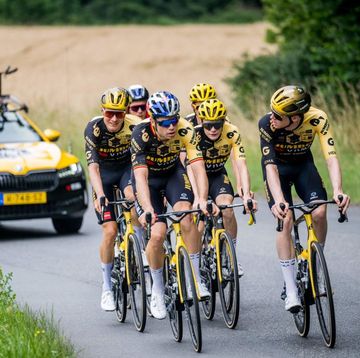
The Fastest Men and Women of the Grand Tours
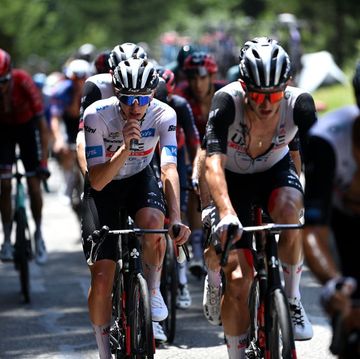
What Do Riders Eat During the Tour de France?
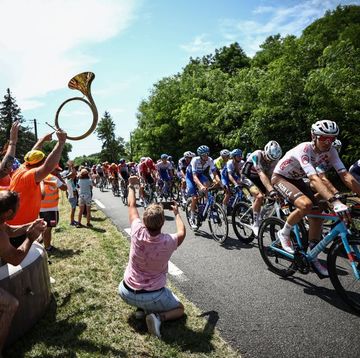
How Fast Do the Pros Ride in the Tour de France?
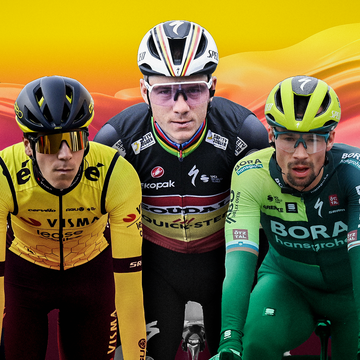
Challengers of the 2024 Giro d'Italia and TdF
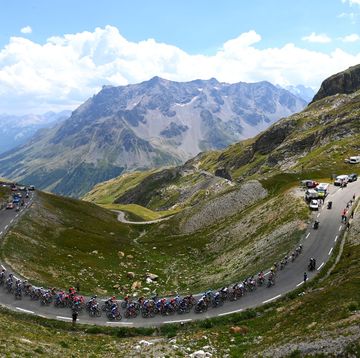
2024 Tour de France May Start Using Drones
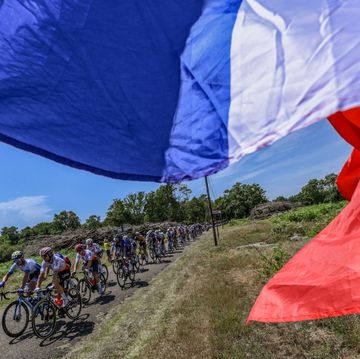
The 2024 Tour de France Can’t Miss Stages
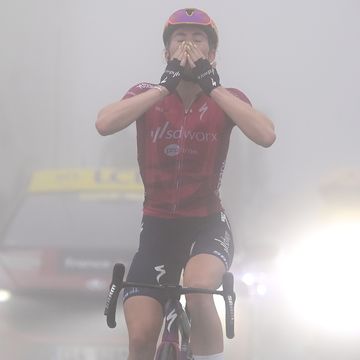
Riders Weigh In on the Tour de France Routes
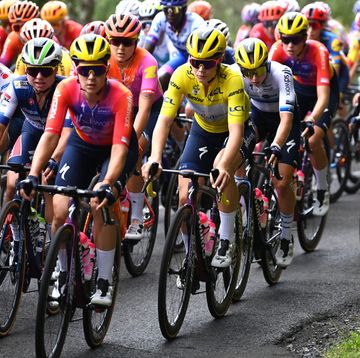
2024 Tour de France Femmes Can't-Miss Stages
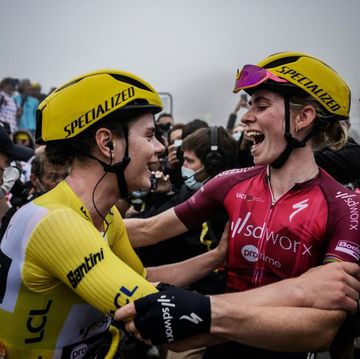
How Much Money Do Top Tour de France Teams Make?
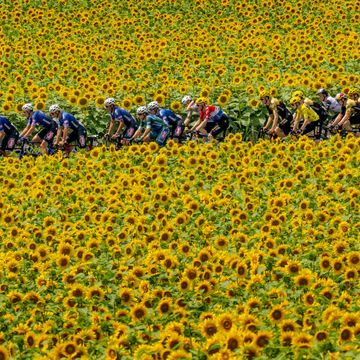
2024 Tour de France/ Tour de France Femmes Routes
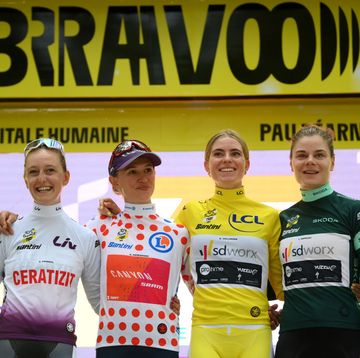
How Much Did Tour de France Femmes Riders Earn?

Bernard Hinault
One of the best cyclists in history, Bernard Hinault is recognized as one of the fiercest and most combative racers the sport has ever seen. He was born in 1954 in Yffiniac, France, and started riding professionally in 1975. He rapidly established a reputation as a powerful all-around racer who could do well in a variety of racing circumstances.
In 1978, Hinault won his first Tour de France; over the course of his career, he would go on to win four more. He also won a number of classic races, such as Liège-Bastogne-Liège, the Tour of Lombardy, and the World Road Race Championship. He also won three Giro d’Italia editions, two Vuelta a Espaa editions, and two editions of the Vuelta a Chile.
On and off the bike, Hinault was renowned for his toughness. He frequently disagreed with race officials and fellow competitors and was not hesitant to express his opinions or defend his stance physically. Over the course of his career, he also had multiple wounds, such as a ruptured spleen, fractured nose and jaw, broken collarbone, and many others.
Although Hinault ended his career as a professional cyclist in 1986, his reputation as one of the sport’s greatest athletes endures. He continues to compete in cycling and can frequently be spotted at important competitions and events all over the world.
Bernard Hinault’s greatest achievements :
Advertising links are marked with *. We receive a small commission on sales, nothing changes for you.
Popular Ressources
Guide: Buying a Bike
Most famous Cyclists of all time
Mountain Bikes
Legal Information
Legal Notice
Privacy Policy
Terms and Conditions
© 2024 cyclinghalloffame.com | Sitemap

Greg LeMond, Bernard Hinault and the 1985 Tour de France
By owen mulholland.
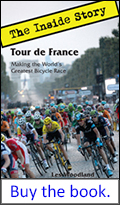
Les Woodland's book Tour de France: The Inside Story - Making the World's Greatest Bicycle Race is available as an audiobook here. For the print and Kindle eBook versions, just click on the Amazon link on the right.
In 1975 Owen Mulholland became the first American journalist accredited to the Tour de France. Here's his report of the 1985 Tour, written shortly after it finished.
Stage-by-stage results for the 1985 Tour de France
Greg LeMond is probably the nicest guy to ever win bike races. It's so simple. Somebody says, "Go!", you step on the pedals hard, and down the road you try to cross a line before everyone else. It's a game Greg plays very well and the last thing he expects is criticism for winning.
So why was Mr. Nice Guy shouting at his team director, Paul Koechli, at the finish of the seventeenth stage of this year's Tour de France. Hadn't Greg finished fifth that day, best of his team? What gives? Anyone who enjoys the Dallas TV show can appreciate the twists that make a simple story into a soap. In this case the plot is extra sudsy.
Greg is hot property. Everyone recognizes that he has some of the fastest legs in the business. The problem for Greg is to find a situation that will allow him to use all that dynamite. When Bernard Hinault , the aging lion of European cycling, asked Greg to join his team for 1985 as co-leader, it seemed the perfect opportunity. Hinault publicly declared that he would like to devote his last two years to developing a young rider. The whole cycling world knew he was referring to Greg.
Hinault was probably as honest with the world as he was with himself. He appeared to have difficulty recovering from knee surgery and a supporting role would be a graceful way to bow out of the sport.
But the thirty year old Breton is a born winner, and when he nursed himself back into top form this year the unspokens were louder than the overtly expressed.
Bernard and Greg crashed the Tour of Italy garden party in May. Bernard kicked ass from one end of the Italian boot to the other, and while he took a breather Greg landed counter-punches. They rolled away from the race, first and third, like two western outlaws after a good barroom brawl.
Having been the perfect sideman in Italy, Greg arrived at the Tour de France half-hoping it was his turn to start the shoot-out. Half hopes became quarter hopes in exactly 8 minutes and 47 seconds, the time it took Hinault to fly around the opening 6.8 km prologue time trial. Greg could only manage fifth, at 21 seconds.

Bernard Hinault winning the prologue
In a race that takes over 100 hours, what's 21 seconds? Not much in time, but everything in pecking order. As the headline in L'Equipe said, Hinault's performance "showed he was still the master of the peloton…and his team." Of course being in yellow before his hometown fans didn't hurt le Blaireau's (he's known as the "Badger" for his tenacity) popularity. They knew this might be the last time they would see their hero leading the Tour, the last chance he have of equaling the record of five Tour victories.
Through the first week Bernard was only too happy to let others take the yellow jersey and its attendant responsibility of controlling the race. It's very tiring for a team to monitor attacks and Bernard knew his men would need to be as fresh as possible for later. But behind the mask of disinterest the Badger was carrying a big stick and could strike at any time. Fear paralyzed his opponents.
On these flat stages through northern France it was necessary to look elsewhere for subplots. North Americans could be especially proud to find Steve Bauer (Canadian) and Doug Shapiro (American) place first and second on the list of Tour neophytes. The list ran to over 80. All were employed as "domestiques", cannon fodder for the team generals. They do all the fetch and chase work so the generals can pedal along in relative serenity. That Steve and Doug could dutifully carry out their orders and still be placed well shows how quickly they were adapting to the Tour. Most newcomers soon slip to the back of the classification sheets, worn out by the incessant toil and extra distance pros are expected to handle.
Both Steve and Doug are graduates of the Olympic class of '84. Bauer had to settle for the silver medal while Shapiro had an even more traumatic time; on the eve of the race he was told he wouldn't be on the team. Someone else had been selected in his place. After the games both men turned pro and went to Europe.
Bauer was recruited by LeMond for his La Vie Claire team while Doug accepted an offer from the Dutch squad, Kwantum. Both knew what was expected of them, but wearing the white jersey of best rookie was an honor Shapiro coveted. "It's hard to tell how things will go, " he said hesitantly, "but sure, I'd like to have that jersey. Maybe in the mountains…"
Furthermore, just about anyone who might challenge Hinault knew French as a second language. Phil Anderson , the Australian with an American wife, had the nerve to challenge Hinault in the mountains during his first Tour. Every year he's near the top, but he always has a bad day, and loses too much time. Still, at 26 he was at the height of his maturity and experience, and his Dutch Panasonic team was one of the strongest in the race.
The rather small country of Ireland pulled off an genetic miracle by fielding two super riders, Sean Kelly and Stephan Roche . Kelly, at 29, is a tough country lad who speaks little and does everything well. In 1984 he was Europe's best overall rider. He's on the tall side though, which hampers his climbing. His younger compatriot is just loaded with talent, but the consistency necessary to be a Tour winner has always been missing. He hoped 1985 would be different.
Then there was Robert Millar, the slim Scot who climbs on two catapults. He had almost won the Tour of Spain in April when bad luck dropped him to second. He hoped for better in the Tour.
Hinault could read the tea leaves as well as anyone. He decided to bust up the place before anyone got the drop on him. The opportunity was clear enough; the eighth stage "race of truth", a 75 kilometer time trial in Alsace.

Content continues below the ads
This was the longest Tour time trial since 1960. Their length has been reduced over the years since it was felt long time trials tend to favor a certain type of rider, and normally the Tour route is so balanced that the winner must do well in all the varied challenges it presents. By reinstituting a big time trial critics felt the Tour was attempting to do Hinault a favor.
That said, it's the same course for everyone, and the way Hinault tackled it he left everyone in a daze. Two minutes and twenty seconds covered the distance between the finishers from second to twenty-fourth. That same time gap yawned between Hinault in first and Roche in second! Hinault was back in yellow, and with such a show of force the others wanted to give up on the spot. Kelly, in a sign of begrudging respect, admitted that, "I believe you have seen the man who can make the big differences, one who is capable of winning the Tour."
It was like a boxing match in which the first real blow scored a knockdown. Awesome to see, of course, but hey, we came to see a fight, not a massacre. If somebody of the class of Millar can lose 6 minutes, 38 seconds in a mere 75 kilometers, it hardly matter what he might pull off in the mountains. He could never hope to make up such losses.
Still, hope flickered. Maybe it was a sucker punch. In three days the race would enter the Alps. Maybe then we would see a little resistance from someone. But the Breton was of no mind to let anyone believe they had a chance. He almost spit out his challenge. "When you are the strongest, you make the law. Let the others suffer." Harsh words from a hard man, a man who had endured humiliations while on the comeback trail from surgery last year.
As soon as the field hit the first of three Alpine climbs Hinault floored it. The field went into shock. With 75 kilometers remaining in the stage no one dreamed he'd try a move so early. Shapiro remembered the surging attack. "After 120 kilometers of flat riding it takes a little time to get into a climbing rhythm. Of course I couldn't see what was going on up front, but we just started going faster and faster and faster. Gaps opened up and pretty soon I was in a dropped group."
It had been a pre-determined move. Greg was frustrated at not being in on it. "The plan was for Bernard to attack first and for me to come up to him with the first counter-attacks, but there weren't any!" he said with exasperation. Hinault had done it again. Another blow and another knockdown. Only the Colombian condor, Luis Herrera, could hold the pace of the master. On they romped, while behind desperation was rampant. Roche lost more than two minutes, Kelly and Anderson over three, and the Italian, Roberto Visentini, a supposed longshot, was out of the ring at over five minutes.
The next day, featuring no less than seven mountains, offered all sorts of possibilities to anyone with ambitions. But who dared be ambitious? Indeed, rolling along at the front, surrounded by the strongest team, Hinault gave fits to others without, it appeared, even trying.
Kelly threw up on himself, yet still found the courage and strength to stay with Hinault. Others were less fortunate. Anderson, for example, lost more than two minutes, and this on a stage where Hinault hadn't even attacked!
Another time trial on the following day allowed Hinault to gain yet more time on his principal adversaries. Journalists threw up their hands in despair. Such domination, however magnificent, is hard to write about day after day. They were reduced to such extremes as, "Hinault didn't win by as much as expected."
The coffin containing all the supposed pretenders appeared to be nailed firmly shut. With half the race still to go, the headstone reads: 2. Greg LeMond @ 5' 23" 3. Stephan Roche @ 6' 8" 4. Sean Kelly @ 6' 35" 5. Steve Bauer @ 8' 23" (!!) 6. Phil Anderson @ 8' 33" 7. Niki Ruttimann @ 10' 31" (another Hinault man) 8. Pascal Simon @ 11' 11" (first French challenger) 9. Joop Zoetemelk @ 11' 14" (A former Tour winner, but at age 39, being only 11 minutes down was a miracle) 10. Pierre Bazzo @ 12' 39"
The two Alpine stages had actually been won by the Colombian mountain goats, Luis Herrera and Fabio Parra. Unfortunately, like all Colombians, they had lost so much time on the flat stages that their climbing prowess, however brilliant, didn't mean much in the overall picture.

Stage 14: Herrera goes and stays gone.
Small matter to the folks back home. Cycling is Colombia's number one sport. They had more media people at the Tour than any other country except France. After the twin stage victories President Betancourt personally phoned to congratulate them.
It's difficult to appreciate the psychological impact of such stage victories, but it's comparable to the effect on Japan after the Russo-Japanese War of 1904-05. In sinking the Russian fleet Japan was able to discard the sense of inferiority most non-Western nations have had after their first encounter with the white man's world.
Of course millions suffered as Japan fulfilled its juvenile notion of equality, but insofar as the Tour battleground can serve as a national catharsis we can be thankful for this two-wheeled refinement on the crudities of warfare.
Colombia has one of the highest homicide rates in the world. When out training the last rider carries a gun, and he is never dropped. (In Colombia good bicycles are as valuable as cars.) The RCN radio boys carry a device that bypasses a phone in the booth. Cut, cut, splice, and voila, direct transmission! Herrera, Parra and company have shown their countrymen that they can play by the rules and win. It will take some time, of course, but their example will have its effect.
Fears of the big Tour being a big snooze haunted the race. With Hinault astride his competitors, the closest of whom was his young American teammate, there appeared no cracks in his impregnable edifice.
The only hope lay in the Pyrenees. Just possibly all those big efforts by Hinault might have a cumulative effect, or so it was hoped by anyone who dared to have even dreams of challenging the maillot jaune . The three stages across central France promised to be a lull before the storm.
Two of them were, but the first one, to St. Etienne, almost upset everything. In the field sprint Bernard was caught up in a mass crash at over 30 mph. He lay inert on the pavement for minutes before finally remounting his bike and rolling across the finish line. His face was a mask of blood. All France held its breath. The verdict: a broken nose, but nothing terminal. To prove it he sprinted the next day, a risky and unnecessary thing to do, but impressive nevertheless. He claimed, "My form is as good as ever and I sleep like a baby," but it was hard to believe looking at his two black eyes and extensive cuts.
Mountains. For the Tour they are like the time trials, another form of truth serum. Sucking wheels doesn't help much under 10 mph.
Greg LeMond, the official team co-leader with Hinault, had hopes for an unlikely situation to develop. He was prohibited from attacking Hinault by their mutual non-aggression pact. But if, just if, a major rival got away on the climbs, and if, just if, Greg could go with the guy and Hinault couldn't, then Greg could conceivable be dragged into the race lead. On paper it was possible.
The seventeenth stage from Toulouse to the Pyrenean ski station of Luz-Ardiden had to be the promised land to anyone with pretentions. The 210 kilometer stage became progressively more difficult, culminating in an unholy trinity of the Aspin , Tourmalet and Luz-Ardiden.
Halfway up the Tourmalet, Stephan Roche zipped away accompanied by a couple of others, but not Hinault. Watchdog LeMond, just doing his job as chief defender, shot across the widening gap and became the caboose-in-residence. Roche had finally found his climbing legs just when the battered Hinault seemed to have lost his.
Over the top, down to the valley below, and then onto the final 13 kilometer killer. Fog closed in, television coverage went blank, and the pedaling robots, uninformed about the gaps to other groups, switched over to autopilot. LeMond believed he was on his way to the yellow jersey. He tested Roche with small attacks, but finding resistance Greg went back to tailgating. Suddenly, out of the drizzle emerged the Hinault group. and although it didn't contain Hinault, Greg knew he couldn't be far behind.
Greg's paranoia that the team was really rigged for Hinault appeared justified. Upon crossing the finish line LeMond openly accused Koechli of "making me lose the Tour." If he had been informed of the group approaching from behind Greg could have gone a lot harder. "This was a day when I cold have won!" He shouted as the full sense of betrayal sunk in.
Koechli claimed that conditions made it impossible to get any information to Greg. If nothing else the incident showed Greg had exalted ambitions and private fears. The sweet detente had been broken and the bubbling rivalry between the two great riders had been exposed.
Fortunately, Greg's parents had chosen this day to visit the race. He returned to the team hotel in their car and his father, Bob, we instrumental in reconciling Greg to his team. "If Bob hadn't been there," Mrs. LeMond said, "I think Greg might have quit the team and the race right there."
The mountains were over and with them went Greg's last chance to win the 1985 Tour de France. There remained, however, one forum where Greg could clearly state his case, where his American notion of the-best-guy-wins could be given unequivocally.
It was the twenty-first stage, Saturday, July 20. 45.7 kilometers around Vassiviere lake in central France. Yes, another time trial, the last "race of truth". Its many corners and ups and down made most riders leave their disc wheels and aero bikes in the vans. No gimmicks this time, this "final exam" promised to reveal the most complete rider in the race.
One hour, two minutes and 837 milliseconds proved he was that man. Not panicked by the news that Hinault was slightly ahead at the first two time checks LeMond kicked in his turbo, just as the master, Bernard Hinault, had done so many times. Anything less than No. 1 just wouldn't do.
Bernard took his modest five second defeat with grace. "I couldn't be happier if I'd won, myself, " he avowed. "This is an historic day. The first stage win by an American in the Tour de France."
This reporter awaited Greg at his hotel, champagne at the ready. Greg arrived euphoric, the bitter thoughts of earlier days sweetened with the antidote of victory. "Yeah," he said purposefully, "I really wanted to win this one." The feeling was inescapable that the next win wouldn't be so long forthcoming.
It had been a little scary at time for the wounded lion, Bernard Hinault, but now nothing stood between him and the destiny all France wished to see. He arrived on the Champs Elysées like a king escorted by his court. There would be no more surprises. Bernard Hinault stepped into the record books, now equal with Jacques Anquetil and Eddy Merckx at five Tour wins each. And that's about as close to immortality man is ever likely to get.
© McGann Publishing
- International edition
- Australia edition
- Europe edition
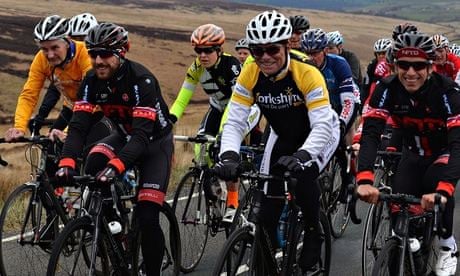
Bernard Hinault: ‘Of course I want to see a Frenchman win the Tour’
I t’s always entertaining to watch a national institution on unfamiliar territory, and after Bernard Hinault steps out of a red Tour de France Skoda outside the Robin Hood pub in Cragg Vale, there are some choice moments. The five-times Tour de France winner has a rapid pie and pint in the bar, runs through a load of questions for the local press, then slips into cycling kit for a spin to the top of what purports to be the longest climb on English soil with a group of local cyclists.
Repeatedly, he’s asked to sign pretty much everything from posters through T-shirts to the bunting which the locals are going to run up the telegraph poles when the Tour comes through on 6 July. It’s grey, it’s bone-achingly cold, but Hinault doesn’t shiver when later he is made to stand on top of Holme Moss for yet another photograph. This is, after all, the man who still gets pains in his fingers which he can trace back to a particularly chilly race through wet snow to win the Liège-Bastogne-Liège Classic in 1980.
Hinault is no longer the angry man of French cycling, the guy who once said that he wished he had a jacket with tacks on it, to ward off the back-slappers who would hassle him after stages. The Badger has mellowed. He jumps through the hoops that are part of his contract with the Tour de France organisers with the same professionalism that was his hallmark on the bike: he has signed up for it, so he gets on with the job.
Seamlessly, almost surreptitiously, Hinault has joined the establishment. In the turmoil that has surrounded the Tour in recent years, the Breton remained one of the constants – a reminder of simpler times, when the Tour was often a contest between Frenchmen. His career ended in 1986, in a year that marked a turning point for the sport, with Greg LeMond’s Tour de France win marking the point where it became truly international. It was one of the most controversial races of recent times, with LeMond insisting that Hinault tried to rob him of victory; to this day, Hinault maintains he always had the young American’s best interests at heart.
We drive from Cragg Vale over the Moss and up and down the plethora of little climbs that will make stage two of the Tour into Sheffield one of the toughest opening-weekend stages the race has seen in recent years. The Badger waxes lyrical about the stone walls – “imagine the skill, the hours of work that’s gone into those” – speculates about what wine you might drink if you shot and cooked one of the pheasants in the moorland fields, and enjoys the comparison between Yorkshiremen and the famously tough and slightly insular Bretons.
He expects the start in Yorkshire to be “grandiose”, perhaps outstripping the London Grand Départ of 2007 in spectator numbers. “London is a big city, a huge population, I know that in the two days we did there, I’d never seen as many people. It’s still one of the very best Grand Dé parts, but it’s possible that the same people who watched the race in London will turn up in Leeds. The promotion that’s been done in Yorkshire means a lot of people are going to turn out.”
Since London, he believes, the trend has been for each Grand Départ to see more hype, more spin-off events; his presence in Cragg Vale on a chilly spring day is all part of that. “It’s evolving. It’s not exactly getting bigger, but the events around the race are growing, they are making more of it, doing more to ensure that it’s a huge success. There’s a lot of dialogue, a lot of preparation. London marked the start of all that.”
As far as the racing goes, he’s not certain that Mark Cavendish will have it all his own way on day one – not a controversial view given the dominance of Marcel Kittel – and clearly relishes the succession of tight little descents on narrow roads and the gritty little climbs that pepper the end of the Sheffield stage. “The riders won’t enjoy this, especially if it rains,” he says smugly.
“I’d probably have complained but I’d have had a bit of fun here. ‘Ce n’est pas pour des enfants de choeur,’” he smiles – not a stage for choirboys. “It’s a stage for those who don’t necessarily want to win the Tour, but who want to make an impact. It will be tough to control, you could see a couple of riders get 10 minutes here because teams may not want to take the initiative and chase.
“I don’t see a group of more than 30 or 40 at the front in the finish – it’s a very demanding course with that constant climbing and descending. If they race hard, there could be even fewer. Anyone who has come to the start of the Tour a bit off his best form thinking he’ll ride himself in in the first week is in for a shock. You can see a couple of the very best going away on the last climb.” Hinault’s tip for the best man on Sheffield’s Jenkin Road, the steep urban ascent in the finale of stage two, is Peter Sagan , the Slovak all-rounder, or – perhaps with a hint of national sentiment – the evergreen Thomas Voeckler .
Voeckler is the only French cyclist to get within a whisker of winning the Tour in recent years and the closest France has to a Tour star, 10 years after his breakthrough in the Lance Armstrong years. Hinault, however, remains the last French winner of the Tour, and it is almost 30 years since his fifth and final victory in 1985. He is not optimistic that this is about to change.
“Intrinsically we haven’t got a rider who can win the Tour. On a rien . We’ve got nothing. A Frenchman can only win this year if the others race poorly. Voeckler could have won in 2011 if he had raced differently but he came fourth. If [eventual winner] Cadel Evans hadn’t put his team on the front of the bunch and made them ride behind the break on the stage to Saint-Flour, perhaps Voeckler would have won the Tour. It doesn’t take a lot.”
Hinault is realistic enough not to get worked up about it. Cycling has internationalised since his heyday. “Cycling is open to other countries today – we’ve had Australians, Americans, English cyclists winning the Tour. You have to be the best in the world today. The Italians had to wait longer than we did after Gimondi won in 1965 [to Marco Pantani in 1998] and the Spanish went a long, long while without winning and then suddenly you had the Delgado-Indurain years. The English waited 100 years before winning the Tour.
“Cycling is open to the whole world. Tomorrow it will be an African, the year after that someone from China or India. It will be the bravest rider and the one who has the most willpower, the one who has the most courage, who trains the most. Who would have thought three or four years ago that Bradley Wiggins would win the Tour de France when you saw how he raced when he was at the Cofidis team? With Wiggins, when he was in a French team, was he made to work a little bit harder? Did anyone put the structure in place that enabled him to do that? All at once, someone believed in him, someone gave him a bit of a push, and off he went.”
Hinault believes in the cycling champion as all-rounder, not just limited to the register of three weeks in July. “In my view the champion must know how to do everything – track, cyclo-cross, road – that’s a real champion.” He agrees that the only cyclist of the moment who fits that template is the Dutchwoman Marianne Vos , world champion across the board in every discipline she contests.
“Yes, she wins everything, she knows how to do everything. Wiggins can do it as well but never has – he can win Tours, ride time trials, ride the road, he could probably do cyclo-cross as well if he wanted. He needs to win a classic, that’s all, and I think he can do it. If he prepares well, if he has that as his sole objective, there’s no reason why he couldn’t do it. He is a rider who can win the Tour of Lombardy, perhaps Milan-San Remo next year; the Tour of Flanders or Paris-Roubaix may be a bit specialised for him, but we’ll see. Flèche Wallone, Amstel ... He can win those.”
Hinault accepts that, in men’s professional cycling, the incentive of performing in the Tour is so great that the riders have no option but to specialise. “I’m not disappointed, it’s just a different way of seeing things. Everyone would like to see a champion who can win Classics in spring, then be present at the Tour de France, then go for the Tour of Lombardy. When you talk to people that’s what they say – that doesn’t happen any more. The fans miss it. [People who work in professional cycling] understand that today’s riders choose their objectives for the season but the normal human being by the roadside finds he has a bit less to dream about.”
French cycling does have a good number of up-and-coming riders – Hinault likes the look of Thibaut Pinot , who won a stage of the Tour in 2012, and Warren Barguil, impressive in last year’s Vuelta a España – althouigh he misses this year’s Tour. There is Voeckler, an example, Hinault believes, of a rider with “a small engine who gets there through sheer hard work”. There are also a strong generation of sprinters led by the multiple Giro d’Italia stage winner Nacer Bouhanni, another to miss out in 2014, and the trackman Bryan Coquard.
Hinault, however, doesn’t believe it is systems that make champions – they enable talented cyclists to develop, but how they progress is down to the individual, rather than the structure behind them. “In the beginning you have a man who is exceptional, who has something the others haven’t got. Then he puts in an exceptional amount of work.
“But you don’t find those people just like that – the guy who has a little bit more in him than the rest. It doesn’t matter where he comes from, whether he’s in a French team, a British team, an Italian or Spanish team. Le champion, c’est le champion. Of course it can happen for a French cyclist.”
The question is: when? As Hinault acknowledges, with a little bite from the Badger of old. “Of course I want to see a Frenchman win the Tour – I hope it happens in my lifetime.”
- Tour de France 2014
- Tour de France
Most viewed
Expert road bike reviews and the latest road bike news, features and advice. Find rides & events, training articles and participate in our forums
Bernard hinault interview: ‘to win the tour, i would have punished my rivals in yorkshire’, tour de france legend shares his thoughts on grand depart.
Legend can be an over-used word, certainly in sport, but the achievements of some mean it is almost not strong enough of a description.
Bernard Hinault is one man who certainly fits into such a category, a legend of cycling so great he is revered in some quarters almost as a deity of the sport.
Five Tour de France wins and ten Grand Tours in total, the world championship, Paris-Roubaix, the Giro di Lombardia – his palmares is packed with success on the biggest stages of all.

So when he speaks, you most certainly listen and Hinault has some words of advice for the WorldTour’s elite as they prepare for the Tour de France Grand Depart in Yorkshire.
The big occasion is now less than 100 days away, the milestone having been celebrated in Harrogate yesterday (March 27), and Hinault was among the guests invited to the White Rose county.
And having been on a recce of the route for stage two – a stage many think could be one of the decisive ones in terms of the final destination – he shared his thoughts on how to approach it with RCUK.
He said: “Having been on the last 90km of the second stage, I can say it is very difficult – there is a lot of climbing and they are difficult climbs.
“For me, it was easy – I was just in a car – but those roads, for the cyclists, will be difficult. There are some very fast downhill sections too, which are very technical.”
Not that ‘difficult’ routes ever held back Hinault in his prime of course – the thought of him putting his rivals to the sword in the Yorkshire Dales certainly does not take too much imagination.
As the likes of Greg LeMond and Dutch icon Joop Zoetemelk will attest to, this is a man who thrived on ‘difficult’.
And the Badger has some very simple advice for the leading contenders – Chris Froome (Team Sky) and Alberto Contador (Tinkoff-Saxo) among them – if they are to stay in contention after stage two.

Hinault explained: “It is a stage set for the sort of riders who are in peak form. The ones who, on the start line, are at 100 per cent condition.
“For a rider to win this Tour, they know they can’t just turn up and be at 60-90 per cent level. It will be a very exciting stage, and very challenging.”
Hinault’s passion for cycling is certainly something which has not been diminished in retirement – unsurprising given roles he has taken on such as an advisory position for Team Raleigh.
Fittingly, he still reads the roads and routes as though it were him riding them too.
And the Frenchman insists, if that were the case, his rivals would be in for the fight of their lives in Yorkshire as he looked to rid himself of the leading contenders before the race even hit France.
He said: “We think that the stage will have a big bearing on the race, and that one of the big contenders will win but don’t forget it is the riders themselves who decide a race.
“If they don’t attack, maybe it will not turn out how we expect.
“But if it were me racing this, I would do everything to try and be in super condition, right from the very start. I would have tried to get rid of some of my main competition out there on this stage. I would have really tried to open the race up immediately.”
With a palmares as glistening as Hinault’s, it is certainly advice well worth heeding for the current generation when the eyes of the word turn to Yorkshire in July.

Wiggle Etape Cymru 2014: rugby legend Gareth Thomas shares his training plan
12-week riding programme for former Wales and Lions star

La Flèche Wallonne 2014 - five observations
Valve released, why we're on first name terms with the Mur, and more
Featured in this post

Tour de France
Related articles.

Photo gallery: Marcel Kittel previews Tour de France Grand Départ in Yorkshire
German fast man backs bunch sprint for stage on - but believes stage two will be "like a hilly Classic"

Eight reasons why you should ride the Paris-Roubaix sportive
Why the pavé of Paris-Roubaix should be on your bucket list

La Fleche Wallonne Femmes 2014: photo gallery
Armitstead maintains overall World Cup lead with second place, Pooley finishes seventh
Newsletter Terms & Conditions
Please enter your email so we can keep you updated with news, features and the latest offers. If you are not interested you can unsubscribe at any time. We will never sell your data and you'll only get messages from us and our partners whose products and services we think you'll enjoy.
Read our full Privacy Policy as well as Terms & Conditions .
Cookies help us deliver our services. By using this website, you agree to our use of cookies. Learn More
- Giro d'Italia stage 5 Live - Will Jonathan Milan win again?
Hinault leads Fignon tributes
Leblanc, Bernard, Gallopin, Boyer and Armstrong remember Tour champion
Five-time Tour de France winner Bernard Hinault has led tributes to the late Laurent Fignon, who died today after a battle with cancer. He was fifty years old.
Laurent Fignon treated for "advanced" cancer
Fignon at the Tour de France despite battling cancer
Laurent Fignon passes away
Laurent Fignon remembered
“I’m moved, and everybody who loves cycling is moved,” Hinault told i-Télé . “We were teammates before being rivals, one against the other. He always fought to win. This time he fought and he has lost.”
Hinault was Fignon’s team leader when he turned professional with the Renault-Elf team. After Hinault moved to La Vie Claire, he was defeated by his former protégé in a memorable duel at the 1984 Tour de France.
The pair appeared on the podium at this year’s Tour de France after stage 15 to Bagneres-de-Luchon when Hinault presented Fignon with a special combativity prize in a poignant recognition of his battle with cancer.
Former Tour de France director Jean-Marie Leblanc was similarly moved by Fignon’s passing and he was keen to pay tribute to the champion’s panache, on and off the bike.
“Cycling is a big family and when a young former champion dies at just fifty years of age, it cannot but move us,” Leblanc said on the France Info radio station. “His death has come too quickly and too soon.”
After an already promising start to his professional career, Fignon burst into the limelight with victory at the 1983 Tour de France. He repeated the feat the following year with one of the most stylish displays in Tour history and Leblanc’s fondest memories of Fignon the rider stem from this period.
Get The Leadout Newsletter
The latest race content, interviews, features, reviews and expert buying guides, direct to your inbox!
“His first Tour win in 1983 was a victory for youth, audacity and talent,” Leblanc said. “Fignon had character and panache. To win his first Tour at just 23 years of age was remarkable.”
Leblanc also viewed the emergence of Fignon in the early 1980s as symbolic of a new era in cycling, with his victory over Bernard Hinault in 1984 being a watershed moment for the sport.
“If you will allow me to use something of a caricature, Hinault was the Last of the Mohicans of the great generation of the classic champions, while Fignon was the precursor of the modern champions with more panache and impertinence,” Leblanc explained.
Jean-François Bernard, one of Fignon’s rivals from the French peloton in the 1980s, also paid tribute to one of the great personalities in the sport’s history when he spoke to France Info . “Laurent was a fighter,” Bernard said. “Even though I was always on different teams than Laurent, I could still see that he was a rival who would never give in.”
Cofidis manager Eric Boyer, who rode with Fignon at Cyril Guimard’s legendary Renault and Système U teams, had fond memories of his friend.
“He was a patron , he was a fighter. He was never on the defensive and always on the attack,” Boyer said. “I remember his courage, when we trained together in the rain, the cold, the ice.”
Boyer also recalled Fignon’s contribution to cycling after he hung up his wheels, which included his popular analysis on French television and his organisation of Paris-Nice earlier in the decade. “He had the stuff of champions, but Laurent was also a very cultured man. He had a thousand ideas for cycling.”
Fignon analysed this year’s Tour de France for France Television and his colleague Gérard Holtz spoke of his “formidable courage” in carrying out his commentary duties while undergoing treatment for cancer.
“He was honest, sincere and direct, and a huge plus for our team,” Holtz said. “He was an enormous champion right to the end. He had lost a huge amount of weight and could barely talk, but right to the end he showed the resistance of a champion.”
Armstrong and Gallopin remember a legendary cyclist
RadioShack directeur sportif and former professional rider Alain Gallopin was a close friend of Fignon and worked as his masseur before going into team management.
“I’ve lost a brother today,” he told L’Équipe . “I saw a fighter right to the end. Yesterday morning I heard that he was still fighting and that he was looking for information on his treatment. After that, his state deteriorated. This morning I heard that it was over.”
“He was still conscious yesterday afternoon. He knew who was there and he spoke through signals. Everybody was prepared for his death, because in the past year and a half a lot of treatments were tried that didn’t work,” Gallopin continued.
“It became more and more complicated. He gave all that he could. When he told me that he had cancer a year and a half ago, he said to me, ‘in any case, I have no fear of dying.’”
RadioShack rider Lance Armstrong had helped to organise an appointment with an oncologist for Fignon in the United States this year, and he responded via Twitter to the news of Fignon’s death.
“Just woke to the news that Laurent Fignon has passed on. He was a dear friend and a legendary cyclist. We will miss you, Laurent. RIP LF,” he wrote.
The pair first met in Paris in January 1996 after the Cofidis team presentation, when Armstrong was himself battling cancer. Fignon invited the young American to dinner, an episode recounted in his autobiography We Were Young and Carefree .

Thank you for reading 5 articles in the past 30 days*
Join now for unlimited access
Enjoy your first month for just £1 / $1 / €1
*Read any 5 articles for free in each 30-day period, this automatically resets
After your trial you will be billed £4.99 $7.99 €5.99 per month, cancel anytime. Or sign up for one year for just £49 $79 €59

Try your first month for just £1 / $1 / €1

Barry Ryan is Head of Features at Cyclingnews. He has covered professional cycling since 2010, reporting from the Tour de France, Giro d’Italia and events from Argentina to Japan. His writing has appeared in The Independent, Procycling and Cycling Plus. He is the author of The Ascent: Sean Kelly, Stephen Roche and the Rise of Irish Cycling’s Golden Generation , published by Gill Books.
'Okaaaayyy let's go' - Remco Evenepoel training at altitude as Tour de France preparation continues
'Happy I'm still alive' - Tim Merlier relieved and critical after fast Giro d'Italia finale
Which Pogačar was everyone expecting?
Most Popular
Bernard Hinault: 'Mark Cavendish can match Merckx's Tour win record'
Tour de France director Christian Prudhomme hails Mark Cavendish as the race's best ever sprinter - Photos by Yuzuru Sunada
- Sign up to our newsletter Newsletter
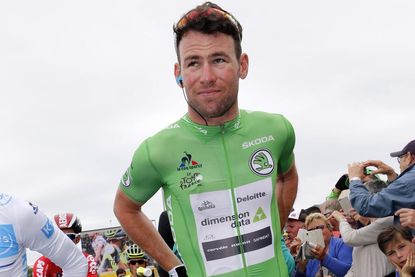
Mark Cavendish (Dimension Data), who won a second time in the 2016 Tour de France on Monday, can catch cycling legend Eddy Merckx 's record of 34 victories, says Bernard Hinault.
With his win in Angers , the 31-year-old Manxman now sits with Hinault in second place with 28 stage victories behind Merckx.
"Why not?" Hinault said before stage four. "He has 28, Eddy Merckx has 34. He will need six and he is not old. He still has the possibility, I think."
>>> Tour de France 2016: Latest news, reports and info
Hinault gave France its last Tour overall win in 1985 and took up work with race organiser ASO after retirement. Belgian Eddy Merckx, who retired in the 1970s, is considered the best cyclist ever with five Tour wins and wins in every monument. Cavendish said he never thought that he would be considered in the same breath as the two greats when he began cycling.
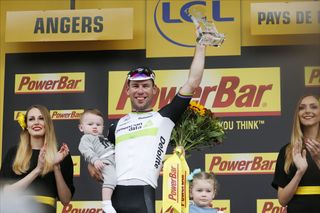
"Why would he not think of that?” added Hinault. “It's a goal in a career, to say, 'I am capable of going out in search of this trophy.' Even if it is not a trophy, because finally they are victories that accumulate one after the other. That is the most beautiful of all about it."
"Yes, he can do it," Tour race director Christian Prudhomme explained. "Six stages, you don't know. He knows the race perfectly, he knows how to win. It will be very hard because he's 31, but it's possible. We will know at the end of this Tour, if he stays with 28 or if he is at 29 or 30. Already with two stage wins in three days is great."
Get The Leadout Newsletter
The latest race content, interviews, features, reviews and expert buying guides, direct to your inbox!
>>> Are Tour de France sprints getting more dangerous?
Prudhomme first met Cavendish when he won in the 2007 Volta a Catalunya. He said, "Maybe this won't be the last time we are together on the podium."
Cavendish took his first stage win in 2008 in Châteauroux and kept going with three more victories. He returned in 2009 to win six times. In 2012, French newspaper L'Equipe named him as the Tour's best sprinter of all time.
Watch: Tour de France 2016 stage three highlights
"Mark is the best sprinter in the history of the Tour, and not only because he has 28 wins. What struck me is that he loves the Tour, he has such a respect for the Tour, for the yellow jersey," Prudhomme added.
"A few years ago we were in the Tour of Oman, I was next to him and I said there's André Darrigade, do you know him? He said, 'Yes, I know, he won 22 stages. André Leducq won 25 stages, Hinault 28, Eddy Merckx 34.' Wow! And here we were in Oman next to the mosque. So, he has this respect for the Tour."
Thank you for reading 20 articles this month* Join now for unlimited access
Enjoy your first month for just £1 / $1 / €1
*Read 5 free articles per month without a subscription
Join now for unlimited access
Try first month for just £1 / $1 / €1
Gregor Brown is an experienced cycling journalist, based in Florence, Italy. He has covered races all over the world for over a decade - following the Giro, Tour de France, and every major race since 2006. His love of cycling began with freestyle and BMX, before the 1998 Tour de France led him to a deep appreciation of the road racing season.
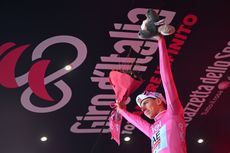
All the action from stage five of the Giro d'Italia 2024 – as it happens
By James Shrubsall Published 8 May 24
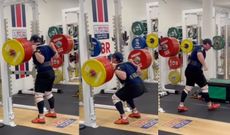
'The more I've lifted in the gym, the faster I've felt on the bike,' says new record-holder Matt Rotherham
By Tom Davidson Published 8 May 24
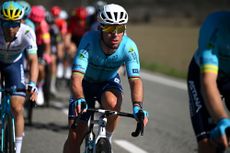
Cavendish will ride Presidential Cycling Tour of Türkiye later this month, Astana Qazaqstan confirms
By Tom Thewlis Published 2 April 24
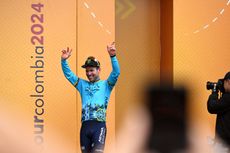
The Kazakh team have bet big on the 38-year-old sprinter. Both they and Cavendish need 2024 to work
By Adam Becket Published 13 February 24
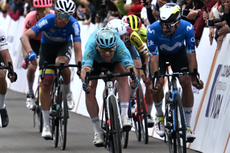
The Briton fended off the challenge of home rider Fernando Gaviria on stage four of the Tour Colombia
By Chris Marshall-Bell Published 9 February 24
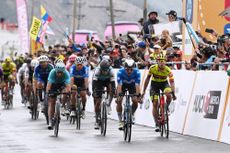
Astana Qazaqstan rider says Tour Colombia stage one result ‘best debut race for a few years’
By Tom Thewlis Published 7 February 24
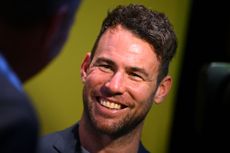
Astana head coach Vasilis Anastopoulos: ‘Cavendish is currently doing lots of hours in the saddle and only short sessions of more intensive work’
By Tom Thewlis Published 25 January 24
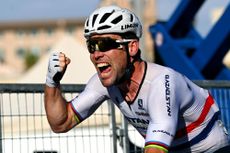
British sprinter will start 2024 season at Tour Colombia in February and will also include two altitude camps in plan
By Tom Thewlis Published 19 December 23
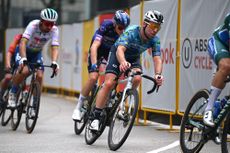
Astana Qazaqstan rider will line up at the Tour Colombia after altitude camp in country
By Tom Thewlis Published 15 December 23
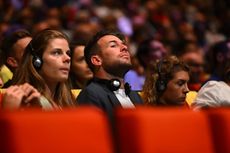
Astana Qazaqstan rider will have to tackle "hard" race if he wants to break the stage win record
By Adam Becket Published 25 October 23
Useful links
- Tour de France
- Giro d'Italia
- Vuelta a España
Buyer's Guides
- Best road bikes
- Best gravel bikes
- Best smart turbo trainers
- Best cycling computers
- Editor's Choice
- Bike Reviews
- Component Reviews
- Clothing Reviews
- Contact Future's experts
- Terms and conditions
- Privacy policy
- Cookies policy
- Advertise with us
Cycling Weekly is part of Future plc, an international media group and leading digital publisher. Visit our corporate site . © Future Publishing Limited Quay House, The Ambury, Bath BA1 1UA. All rights reserved. England and Wales company registration number 2008885.
CURRENT PRICES END MAY 12
Outside Festival feat. Thundercat and Fleet Foxes.
FROM JUST $44
Powered by Outside
Bernal tipped for greatness by five-time Tour winner Hinault
Heading out the door? Read this article on the new Outside+ app available now on iOS devices for members! >","name":"in-content-cta","type":"link"}}'>Download the app .
Egan Bernal will top the Tour de France podium in Paris and is young enough to surpass any of the race’s legends, French great Bernard Hinault told AFP on Sunday.
The straight-talking 64-year-old’s fierce competitive personality earned him the nickname ‘the Badger’, but he was in a relaxed and friendly mood on Sunday on a sunny day at the Village de Depart in a Brussels park.
Hinault is the last Frenchman to win the Tour de France back in 1985 when he clinched his record-equalling fifth tour. He believes Bernal could surpass him.
“It’s possible there will be another winner of five tours.
“There’s Eddy Merckx, Jacques Anquetil, me and Miguel Indurain, but there’s no reason someone else won’t win five.
“Look at Chris Froome – he’s won four of them and let’s see what condition he’s in next year,” Hinault said.
But he was more confident another Ineos rider would be the one, and not reigning champion Geraint Thomas but Bernal, even though he is yet win a Tour yet.
“I believe Bernal will be the No.1 in Paris this year,” Hinault told AFP in an exclusive interview in Brussels.
“And Geraint won’t be far behind him either,” he said, his tone expressing warmth towards the Welshman.
“He (Bernal) may go much further (than me) too if you think for a minute that he looks likely to win the Tour this year. If you start from that principle and remember that he is only 22-years-old, then he may go much further than any of us,” said Hinault.
Everyone wants to shoot you down
Hinault had a warning for the multi-talented Colombian, drawn from his own experience of winning a first Tour.
“Once you have won it, everyone else is out to get you,” he warned. “All their tactics are targeting you, so you have to work out a way of managing that.
“You have to think about the other riders and the attacks they might be planning. There are days when small teams will try and win a stage, which can be distracting. You need to know how much to give and how much not to give so as not to lose out in the big picture.”
Hinault said that wearing the yellow jersey, which he did on 76 days, could also be a distraction.

“The first time I pulled on the yellow jersey was at Nancy, 41 years ago. It was the last big stage of the Tour and after that we went back up to Paris so there was no risk that time,” he said.
“It doesn’t change much, but you become the one who everyone wants to shoot down,” he explained. “When you wear the yellow jersey everyone knows who you are, the leader, this distinctive jersey is so eye-catching everyone automatically sees you and senses you are the leader.”
Froome’s chances of five
During a nine-year run when Frenchmen won the Tour de France eight times, Hinault finished first in 1978, 1979, 1981, 1982 and 1985, He also won the Giro three times and the Vuelta twice. His five Tour victories are – along with Merckx, Anquetil and Indurain – officially the record; Lance Armstrong later won seven times only to be stripped of all his victories.
When asked if Chris Froome would overcome a recent operation on a broken femur in June, Hinault said there was no reason why not.
“He’s 34 now and had a serious accident this year, so let’s wait and see what happens with that next year, what condition he’s in,” Hinault said. “I myself got badly injured, I also pulled out of a Tour injured in 1980.”
“I had an operation on my knee in 1983 and came back and came second the next year in 1984 and then won it the year after in 1985,” he said with a furrowed brow.
“But I was much younger than he was. He’s 34, when I had my operation I was 26 and the second time I was operated on I was 29 … I think it can play a role, age.”
Popular on Velo
What’s it like to be an American cyclist living in France? Watch to get professional road cyclist Joe Dombrowski’s view.
Related content from the Outside Network
One way south, mountain bikers react to their first taste of non-alcoholic craft beer, video review: bmc urs 01 two gravel bike, kiel reijnen vuelta video diary: the painful decision to abandon.
- Tour de France
- Giro d'Italia
- La Vuelta ciclista a España
- World Championships
- Milano-Sanremo
- Amstel Gold Race
- Tirreno-Adriatico
- Liège-Bastogne-Liège
- Il Lombardia
- La Flèche Wallonne
- Paris - Nice
- Paris-Roubaix
- Volta Ciclista a Catalunya
- Critérium du Dauphiné
- Tour des Flandres
- Gent-Wevelgem in Flanders Fields
- Clásica Ciclista San Sebastián
- UAE Team Emirates
- Arkéa - B&B Hotels
- Astana Qazaqstan Team
- Alpecin-Deceuninck
- Bahrain - Victorious
- BORA - hansgrohe
- Decathlon AG2R La Mondiale Team
- EF Education-EasyPost
- Groupama - FDJ
- INEOS Grenadiers
- Intermarché - Wanty
- Lidl - Trek
- Movistar Team
- Soudal - Quick Step
- Team dsm-firmenich PostNL
- Team Jayco AlUla
- Team Visma | Lease a Bike
- Grand tours
- Top competitors
- Final GC favorites
- Stage profiles
- Riders form
- Countdown to 3 billion pageviews
- Favorite500
- Profile Score
- Statistics by season
- World map of rider races
- Most starts by race
- Starts and results
- Injury history
- Contribute info
- Submit program
- Contribute sites / social media
- Embed rider results
- Top GC results
- Overview - Overview
- Statistics - Statistics
- Results - Results
- Calendar - Calendar
- More - More
- Specialties - Specialties
Bernard Hinault
Grand tour starts and results.
- Biggest, longest, ...
- By vertical meters
- Solo victories
- Top classic results
- Key career stats
- Podium statistics
- % of team points
- Current standings
- Top achievements tick-off
- Career points
- Most underestimated
- Points per race
- Most scored result
- GC time won/lost
- Classics vs GC
- Best PCS National results
- Never competed in
- Racedays per BIB
- Races per country
- KMs by nation
- KMs by race
- Race distance
- Attack kilometres
- Leader jerseys
- Results per parcours type
- Best stage results
- Last attacks
- LiveStats mentions
- Last recorded crashes
- Votes per nation
- All time teammates
- Teammate most raced with
- Most 1-day profile views
- Rider most raced with
- Hits per day
- Points per season part
- Rest periods
- KOM sprints won
- Still active teammates
Grand Tours
- Vuelta a España
Major Tours
- Volta a Catalunya
- Tour de Romandie
- Tour de Suisse
- Itzulia Basque Country
- Milano-SanRemo
- Ronde van Vlaanderen
Championships
- European championships
Top classics
- Omloop Het Nieuwsblad
- Strade Bianche
- Gent-Wevelgem
- Dwars door Vlaanderen
- Eschborn-Frankfurt
- San Sebastian
- Bretagne Classic
- GP Montréal
Popular riders
- Tadej Pogačar
- Wout van Aert
- Remco Evenepoel
- Jonas Vingegaard
- Mathieu van der Poel
- Mads Pedersen
- Primoz Roglic
- Demi Vollering
- Lotte Kopecky
- Katarzyna Niewiadoma
- PCS ranking
- UCI World Ranking
- Points per age
- Latest injuries
- Youngest riders
- Grand tour statistics
- Monument classics
- Latest transfers
- Favorite 500
- Points scales
- Profile scores
- Reset password
- Cookie consent
About ProCyclingStats
- Cookie policy
- Contributions
- Pageload 0.0262s

IMAGES
VIDEO
COMMENTS
Bernard Hinault (pronounced [bɛʁ.naʁ i.no]; born 14 November 1954) is a French former professional road cyclist.With 147 professional victories, including five times the Tour de France, he is often named among the greatest cyclists of all time.In his career, Hinault entered a total of thirteen Grand Tours.He abandoned one of them while in the lead, finished in 2nd place on two occasions and ...
Bernard Hinault has 146 career victories. The biggest victories were Tour de France in 1978 and Tour de France in 1979. ... Professional wins. Type wins. Season. Including stripped results (=) Nr Race Class Date Category; 146: Coors Classic: SPP: 1986-08-22 ...
A year later Hinault kept his promise by helping LeMond to win the Tour, though his exact role in delivering LeMond to the finish line, and his perceived reticence in fulfilling that promise, has ...
Bernard Hinault took on and beat a loose coalition of Spanish stars. The coalition's emergence coincided with Spanish resurgence after the Franco years, live television coverage of their home Tour and began a golden period which culminated in Miguel Indurain's five Tour wins in the early 1990s.
Bernard Hinault (born 1954-11-14 in Yffiniac) is a former professional road racing cyclist from France, active between 1972 and 1986. His best results are 5 wins in GC Tour de France and 28 stage wins in Tour de France.
1. 6. Grand tour leader jersey. 7. Stage win in each of the 3 grand tours. Checklist for Bernard Hinault on 7 top achievements, grand tour victory, world champion, classic monument victory, grand tour podium, World Tour classic victory, grand tour leader jersey and a stage win in each of the 3 grand tours.
Jacques Anquetil, Eddy Merckx, Bernard Hinault, and Miguel Indurain, have won the most Tours with five each. Indurain is the only man to win five consecutive Tours. Henri Cornet is the youngest winner; he won in 1904, just short of his 20th birthday.
A: Bernard Hinault is a legendary cyclist known as "The Badger". He is known for his rapid rise in cycling and his ability to win races. Q: What are some of Bernard Hinault's notable victories? A: Bernard Hinault's notable victories include his first Tour de France win in 1978 and his win in the Giro d'Italia in 1980.
French five-time Tour winner Bernard Hinault was at the height of his career in the early 1980s when the first American professionals—riders like ... After Greg helped you win the 1985 Tour, you ...
Bernard Hinault chases down an attacking Joop Zoeltemelk on the Champs-Elysées on the final stage of the 1979 Tour de France to win the stage and the yellow jersey. The Tour de France has ...
1975-1986. Teams. Gitane-Campagnolo, Renault-Gitane, La Vie Claire. Major wins. 225. One of the best cyclists in history, Bernard Hinault is recognized as one of the fiercest and most combative racers the sport has ever seen. He was born in 1954 in Yffiniac, France, and started riding professionally in 1975. He rapidly established a reputation ...
Having been the perfect sideman in Italy, Greg arrived at the Tour de France half-hoping it was his turn to start the shoot-out. Half hopes became quarter hopes in exactly 8 minutes and 47 seconds, the time it took Hinault to fly around the opening 6.8 km prologue time trial. Greg could only manage fifth, at 21 seconds.
On the day of the Tour de France start L'Equipe has published a list of the top 10 all-time French riders with Bernard Hinault coming out on top. The five-time Tour de France winner, who raced during the 1970s and 1980s, was part of the jury and admitted to the French publication that he voted for himself. Such modesty hardly affected the ...
Setting the scene - Lemond the favourite, Hinault on the attack. Having dominated the 1985 Tour de France, won for a record-equalling fifth time by Frenchman Bernard Hinault, the La Vie Claire ...
French cycling does have a good number of up-and-coming riders - Hinault likes the look of Thibaut Pinot, who won a stage of the Tour in 2012, and Warren Barguil, impressive in last year's ...
As Ollivier noted, 'The rider who intended to win the Giro-Tour double had come to pay his respects to the first man to achieve the feat'; Hinault also visited Coppi's brother Livio, who ...
The biggest victory by PCS points for Bernard Hinault is Tour de France in 1978. The win in Gent - Wevelgem in 1977 was the longest by race distance with a distance of 277 kilometre. The win in the toughest field was in Tour de France in 1986 with a startlist quality of 1872.
Hinault explained: "It is a stage set for the sort of riders who are in peak form. The ones who, on the start line, are at 100 per cent condition. "For a rider to win this Tour, they know they ...
Five-time Tour de France winner Bernard Hinault has led tributes to the late Laurent Fignon, who died today after a battle with cancer. ... "His first Tour win in 1983 was a victory for youth ...
Mark Cavendish (Dimension Data), who won a second time in the 2016 Tour de France on Monday, can catch cycling legend Eddy Merckx 's record of 34 victories, says Bernard Hinault. With his win in ...
Hinault is the last Frenchman to win the Tour de France back in 1985 when he clinched his record-equalling fifth tour. He believes Bernal could surpass him. "It's possible there will be another winner of five tours. "There's Eddy Merckx, Jacques Anquetil, me and Miguel Indurain, but there's no reason someone else won't win five.
Bernard Hinault has 13 starts in grand tours, 8 starts in the Tour de France, 3 in the Giro d'Italia and 2 starts in the Vuelta a Espana. ... Wins; Most starts by race; Starts and results; Injury history; ... Bernard Hinault. Grand tour starts and results. Number of grand tour starts, including best results and ordered by date. #
Just seven riders have managed to complete the Giro-Tour double in the same season, the others being Fausto Coppi (in 1949 and 1952), Jacques Anquetil (1964), Eddy Merckx (1970, 1972 and 1974 ...